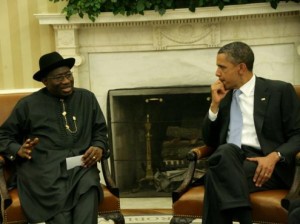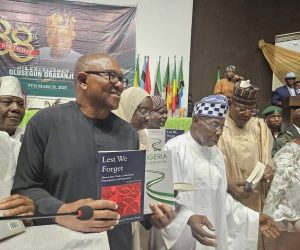U.S. will no longer share military intelligence with Nigeria, due to corruption in the force – Officials

Sensitive data will not be shared with Nigerian officials amid concerns their ranks have been infiltrated by Boko Haram

Sensitive data will not be shared with Nigerian officials amid concerns their ranks have been infiltrated by Boko Haram.
The United States military will not share raw military intelligence with their Nigeria counterparts as both sides work to rescue over 250 girls abducted by Boko Haram, amid concerns over corruption in the Nigerian military and infiltration of the force by Boko Haram, US officials have said.
The U.S. began surveillance flights over north-eastern Nigeria Monday as it leads an international effort to help find the girls kidnapped from a secondary school in Chibok, Borno State a month ago.

The United Kingdom, France, China and Israel are also involved in the mission.
But while the U.S. will be sharing commercial satellite imagery with Nigerian officials, raw military data will be withheld, U.S. State Department officials said.
“At this point, we are not sharing raw intelligence data,” Steve Warren, an Army colonel and Pentagon spokesman, was quoted by the website military.com, as saying.
Mr. Warren declined to give reasons for holding back the information. But the defence website said there are concerns within the U.S. military about corruption in the Nigerian military, and infiltration of by boko haram which has killed thousands of people since 2009.
President Goodluck Jonathan has spoken of his government being infiltrated by boko haram elements and their sympathizers. Serving Nigerian service men in Borno and Yobe State have also accused their colleagues of leaking operation intelligence to the extremists.
David Rodriguez, an Army General and head of the U.S. Army Africa Command, met with Alex Badeh, Air Chief Marshal and the Nigerian Defence Chief, Tuesday, to work out “protocols” for sharing available data.
Mr. Warren was also quoted as saying that General Rodriguez’ presence in Nigeria had been planned previously, and that he was now working out of the American Embassy in Abuja to coordinate an inter-agency team on assisting in the search for the girls.
The Pentagon has said U.S. Special Forces will have no role in the rescue effort. On Sunday, Defense Secretary, Chuck Hagel, ruled out any such role.
But the U.S. Africa Command said a small team of Special Forces and other troops will deploy in Nigeria in two weeks to train Nigerian Ranger battalion to combat the boko haram terror group.
“We want these (Nigerian) soldiers to take the fight to boko haram in the restricted terrain and really eliminate the threat within their borders so they can get back to peacekeeping operations,” Lt. Vinnie Garbarino, a USARAF engagements officer, was quoted as saying in an Army release.
Mr. Warren said 16 troops from the Africa Command are currently at the U.S. Embassy in Abuja, and are working from the Embassy with FBI andintelligence teams on advising the Nigerian security forces in tracking the girls.
Other U.S. troops currently in Nigeria include 50-60 assigned as staff officers to the Embassy and about 20 Marines who were finishing a brief mission advising Nigerian Navy personnel in Calabar on amphibious operations, Mr. Warren said.







